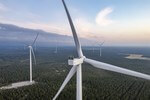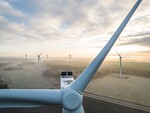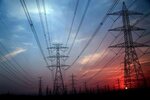05/07/2004
European Commission releases EWEA Wind Report
Just a few days after the European Union officially welcomed ten new member countries into the fold, the continent's major wind energy association and the European Commission released a major report showing where wind energy fits into the continent's energy mix, and its potential to greatly expand on its successes.
The European Wind Energy Association (EWEA), and the European Commission's Directorate General for Transport and Energy (DG TREN) published "Wind Energy - The Facts", a detailed overview of the wind energy sector. The 330 page, five-Volume report provides a comprehensive overview of wind energy's past, present and future in the EU-25 covering: technology, costs and prices, industry and employment, environment, market development and R&D. The wind industry has changed significantly over the past decade. Global installed capacity has increased from 2,500 MW in 1992 to just over 40,000 MW at the end of 2004, at an annual growth rate of near 30%. Over 75% of this capacity has been installed in Europe.
"There has been an explosion in demand for - and interest in - a cleaner energy world from politicians, institutions, policy makers and regulators, the media and the general public. This necessitates a greater depth of understanding of the wind power sector if informed choices are to be made", said EWEA President Professor Arthouros Zervos. "Wind energy provides electricity equivalent to the household needs of 35 million European citizens today, but few people know this - one symptom of the widespread lack of knowledge about the technology". "More installations exploiting wind power can contribute increasingly to European electricity supply and at the same time dovetail with the Lisbon Strategy providing the EU with high-tech world class technology in the electricity sector," said Gunther Hannreich, Director of New Energies and Demand Management at DG TREN. "Furthermore this energy option will have a large impact on meeting the targets contained in the EU directive on renewable electricity and will contribute to fulfill the Kyoto commitments and to foster economic growth and employment.
EWEA projects that wind power will achieve an installed capacity of 75,000 MW in the EU-15 by 2010 if positive policy support continues to develop, This would represent an overall contribution to electricity supply of 5.5%. By 2020, this figure is expected to increase to more than 12%, with wind power providing electricity equal to the demand of 195 million European household consumers. "Wind energy's rapid progress to date has been successful, yet the challenges are only just beginning: to properly exploit the potential of wind energy will help to meet significant goals of the energy security, economic, employment and environmental agendas", said Arthouros Zervos.
The European Wind Energy Association (EWEA), and the European Commission's Directorate General for Transport and Energy (DG TREN) published "Wind Energy - The Facts", a detailed overview of the wind energy sector. The 330 page, five-Volume report provides a comprehensive overview of wind energy's past, present and future in the EU-25 covering: technology, costs and prices, industry and employment, environment, market development and R&D. The wind industry has changed significantly over the past decade. Global installed capacity has increased from 2,500 MW in 1992 to just over 40,000 MW at the end of 2004, at an annual growth rate of near 30%. Over 75% of this capacity has been installed in Europe.
"There has been an explosion in demand for - and interest in - a cleaner energy world from politicians, institutions, policy makers and regulators, the media and the general public. This necessitates a greater depth of understanding of the wind power sector if informed choices are to be made", said EWEA President Professor Arthouros Zervos. "Wind energy provides electricity equivalent to the household needs of 35 million European citizens today, but few people know this - one symptom of the widespread lack of knowledge about the technology". "More installations exploiting wind power can contribute increasingly to European electricity supply and at the same time dovetail with the Lisbon Strategy providing the EU with high-tech world class technology in the electricity sector," said Gunther Hannreich, Director of New Energies and Demand Management at DG TREN. "Furthermore this energy option will have a large impact on meeting the targets contained in the EU directive on renewable electricity and will contribute to fulfill the Kyoto commitments and to foster economic growth and employment.
EWEA projects that wind power will achieve an installed capacity of 75,000 MW in the EU-15 by 2010 if positive policy support continues to develop, This would represent an overall contribution to electricity supply of 5.5%. By 2020, this figure is expected to increase to more than 12%, with wind power providing electricity equal to the demand of 195 million European household consumers. "Wind energy's rapid progress to date has been successful, yet the challenges are only just beginning: to properly exploit the potential of wind energy will help to meet significant goals of the energy security, economic, employment and environmental agendas", said Arthouros Zervos.
- Source:
- Online editorial www.windfair.net
- Author:
- Trevor Sievert, Online Editorial Journalist
- Email:
- press@windfair.net
- Keywords:
- EWEA, European Commision, wind report, wind energy


























